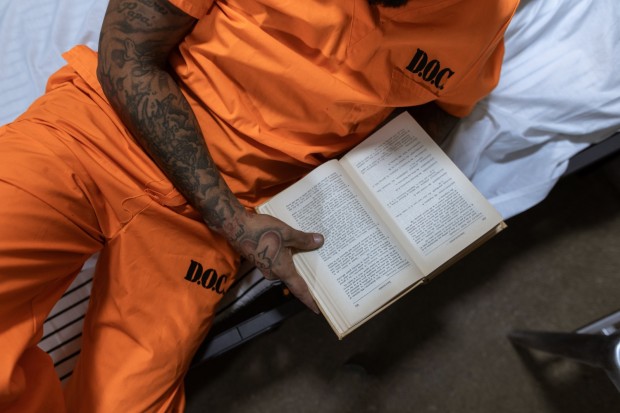The Inside Literary Prize: Imprisoned Writer John J. Lennon and Fellow Inmates to Judge New US Book Award

Imprisoned writer John J. Lennon and fellow inmates are to judge the Inside Literary Prize, a groundbreaking initiative involving 300 incarcerated individuals, bridging literary worlds and spotlighting the transformative potential of literature. The winner will be revealed in June 2024.(Photo : Pexels/RDNE Stock project)
In an unprecedented move toward bridging the gap between the literary world inside and outside the prison walls, the National Book Foundation and the Center for Justice Innovation partnered with Freedom Reads to introduce the 'Inside Literary Prize.' This initiative marks the first major literary award in the United States to be judged by imprisoned individuals. The winner of this prize will be announced in June 2024.
Reginald Dwayne Betts, the founder and CEO of Freedom Reads, is the driving force behind this initiative. In a press release on December 4, Bett states that this initiative will give a platform and allow imprisoned individuals to take part in shared cultural conversation. With a mission to amplify the voices of those often silenced by prison confines, Betts believes that 'freedom begins with a book.'
Ruth Dickey, the executive director of the National Book Foundation, expressed her gratitude for this partnership that brings meaningful conversations about the exceptional books of today and connects notable authors to readers. Courtney Bryan, the executive director of the Center for Justice Innovation, also expressed the center's commitment to amplify the voices of the individuals impacted by the law and value their insight.
One of the notable contributors to this initiative is John J. Lennon, a writer serving a life sentence in Sullivan Correctional Facility, New York. Despite the constraints of his environment, Lennon dedicates his mornings to his craft, writing poetry reviews and articles and editing from the confines of his cell. Lennon cites Michel Houellebecq's and Emmanuel Carrère's works as some of his favorite books. He believes that books offer a unique pathway into deeper conversations about life, mercy, and the consequences of his past actions.
READ ALSO: Turning the Pages of Time: Explore the Best Bookish Calendars for 2024
The panel for the Inside Literary Prize comprises 300 incarcerated individuals selected from six states. These judges will evaluate works by four national book award winners and finalists, including Tess Gunty, Jamil Jan Kochai, Roger Reeves, and Imani Perry. For Lennon and his fellow inmates, this opportunity to judge and engage in literary discourse is a testament to the fact that their words and opinions matter.
The four books shortlisted for the prize were chosen by a selection committee, including incarcerated readers, writers, and librarians. The imprisoned individuals will be allowed to participate in real-time discussions, voting, and literary readings before the announcement of the results in June.
In upcoming months, 25 judges across six states will be given copies of the four books. Each facility's library will also receive an additional set, encouraging broader participation among prisoners and correctional staff.
Perry, one of the authors shortlisted for the award, expresses her appreciation for the prize and its acknowledgment of imprisoned individuals' critical insight and wisdom about literature. Perry's sentiments echo the broader sentiment that cultural discussions should include disenfranchised voices, ensuring a more inclusive and representative literary landscape.
While the Inside Literary Prize is a groundbreaking initiative in the United States, it follows in the footsteps of a similar project in France - the Goncourt des détenus. The award was judged by 500 imprisoned individuals across 31 facilities nationwide. Sarah Jollien-Fardel's 'Sa Préférée' ('His Favorite') won among 15 finalists.
Gunty, another author shortlisted for the award, sees the power of these books to ask intimate questions and believes it is a brilliant opportunity for individuals behind bars to encounter the works of fellow writers. In a society grappling with issues of mass incarceration, the Inside Literary Prize highlights the power of literature to bring about positive change, even under challenging circumstances.
RELATED ARTICLE: Most Anticipated Book Releases in January 2024
© 2023 Books & Review All rights reserved.
Popular Now
1
Books to Read After 'Fourth Wing': Top Picks for Fantasy and Romantasy Fans

2
‘The Secret Public’ by Jon Savage Book Review: An Insightful Look Into the LGBTQ Influence

3
Stephanie Regalado's 'If They Only Knew' Column Is Now A Book, Unleashing 60 Anonymous True Stories to Empower Women

4
'No Wire Hangers' Scene That Almost Did Not Happen: New Book Reveals Faye Dunaway's Struggles

5
Rare First Edition of Aphra Behn's Novel 'Oroonoko' Discovered in Kent: A Historic Literary Find

Latest Stories
Book Reviews
‘The Secret Public’ by Jon Savage Book Review: An Insightful Look Into the LGBTQ Influence

Book News
Stephanie Regalado's 'If They Only Knew' Column Is Now A Book, Unleashing 60 Anonymous True Stories to Empower Women

Book News
'No Wire Hangers' Scene That Almost Did Not Happen: New Book Reveals Faye Dunaway's Struggles

Book Reviews
‘The Perfect Couple’ by Elin Hilderbrand Book Review: A Captivating Summer Mystery

Book News
New Book ‘The Franchise’ Reveals Penguins President Kyle Dubas’ ‘Biggest Mistake’ as Maple Leafs GM











